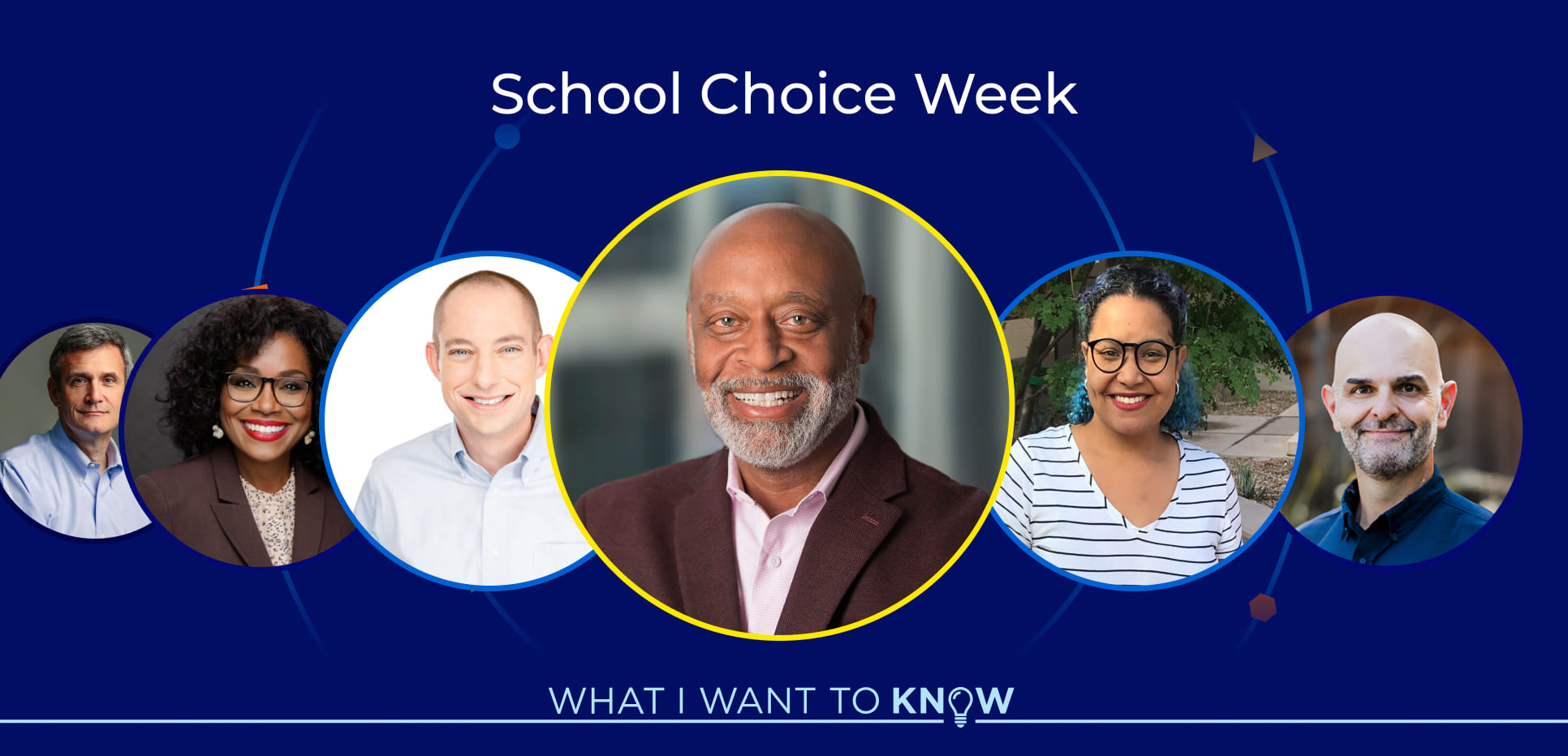In 1982, the Supreme Court ruled, in Plyler v. Doe, that children have a legal right to education regardless of their immigration status. What does that mean in today’s reality? How do partisan politics impact the interpretation of that law? And how has the pandemic affected these vulnerable students?
In this episode, Kevin turns to Senator Tom Daschle, former Senate Majority Leader and founder and CEO of the Daschle Group, to discuss how we can overcome partisan politics to support undocumented students in our education system.
Listen to the Full Audio
Listen on: Apple Podcast, Spotify
Transcript
Kevin: In 1982, the Supreme Court ruled in Plyler v. Doe that children have a legal right to education regardless of their immigration status. But what does that mean in today’s reality? How do partisan politics impact the interpretation of that law, and how has the pandemic affected these vulnerable students? This is “What I Want to Know.”
Kevin: Today I’m joined by Senator Tom Daschle to talk about undocumented students in our educational system. Senator Tom Daschle is founder and CEO of the Daschle Group. Prior to that, he represented the state of South Dakota in the U.S. legislature for more than two decades, first in the U.S. House of Representatives, then the U.S. Senate. During his 18-year Senate tenure, he served as both the democratic minority and majority leader. While in the U.S. Senate, Senator Daschle was a strong advocate for bipartisan immigration reform legislation. Tom, welcome to the show.
Sen. Daschle: Kevin, first of all, let me just say what a pleasure it is to be with you and how much I admire your work in so many different ways, first on the D.C. Council and now with Stride. It’s really been a remarkable partnership that you’ve had with education over these years. So thank you for that.
Kevin: Thank you.
Sen. Daschle: And thanks for the opportunity to join you today.
Kevin: When you were in the Senate, you were known for your approach to bipartisanship. You drove healthcare and you also drove immigration reform. And in today’s world, today’s headlines, it’s a huge, huge issue. Give me your take on the whole issue of immigration reform. I eventually want to talk to you more about undocumented students in our school system, but overall, give me your take, especially since you’ve had such a wide experience in dealing with this issue.
Sen. Daschle: We’re a country of immigrants, but we’re also a country that seemingly always is concerned about being overrun by immigrants. And that kind of dictates the politics. We’re a nation of immigrants. About 15% of the country today is qualified in one category or other as an immigrant. That’s the highest we’ve seen since the 1890s. So it’s been a long time since we’ve seen that percentage, but I think it will continue to be a very dominant part of the political landscape. I regrettably have to acknowledge that it’s been 35 years since we had a major overhaul of our immigration laws, 35 years. I was in the Senate at the time and look back with great satisfaction and great praise for Ted Kennedy and Alan Simpson and others who had the courage to come together in a bipartisan way. Since then, there have been many fits and starts. I worked closely with Trent Lott over the years on immigration issues when I was in the Senate, but I must say it’s been a frustrating experience in so many respects, given the great need there is to change these laws after 35 years.
Kevin: But most people today don’t worry about the 35 years. We’re in sort of an either/or world and it’s either yes or no, you know, it’s literally extremism in terms of the politics. How do we move beyond that?
Sen. Daschle: Well, you’re exactly right. I’ve said for decades and I probably repeat myself too much, but I feel so strongly about this. I’ve always said that compromise is the oxygen of democracy. It is that essential. It is the oxygen of democracy. But compromise today is viewed as capitulation by people on the far corners of the political extremes, and that feeling of capitulation has prevented us from coming together with reasonable approaches on addressing some of the huge challenges we have with regard to immigration, 11 million-plus of undocumented immigrants, farmworkers that are working illegally today just because we haven’t given them opportunities to get green cards. We’ve got the dreamers who are living almost month to month without a clear understanding of what their future holds. But there are many other issues and we just have not been able to address them successfully in large measure because people aren’t willing to compromise.
Kevin: We’ve seen the crazy, I will say horrific scenes of children in holding cells, families sending 12, 13-year-olds to walk 1,000 miles because they’re facing abuse and gang violence in their home countries. How do you read the current situation of the immigration challenge vis-a-vis the impact on children?
Sen. Daschle: Well, I think the stories over the last several years have just been horrific, and they’ve I think sensitized the American people a little bit more on the human consequences, especially the consequences on children separated from their families having no idea of how it is they got here or where their future lies. It is just unbelievable. It’s one of the saddest chapters in my lifetime, and I think that we really have to acknowledge the scope and the extraordinary impact that that scope is having on tens of thousands of children today. We owe them a better future than that. They’re doing what they have to to survive, and the very least we can do is ensure that they have a setting that gives them the opportunity to be educated, the opportunity to be housed and clothed and fed.
As I say, they’re here through no fault of their own. They followed their parents or family members or others, and I might say they’re all seeking refuge from situations in other countries that is untenable, unbearable, excruciating. And so, you really have to want to subject yourself to this horrific experience just to avoid what they’re already experiencing in their lives where they were born or where they live. So it’s a complicated set of circumstances made even more so by the uncertainty, legally and statutorily, around their circumstances once they arrive.
Kevin: Again, we’re in an either/or, with me or against me political climate. On the one hand, while the Supreme Court says that undocumented minors are entitled to be educated in American schools, some say it doesn’t go far enough. Many of these undocumented minors aren’t able to access Pell Grants or other federal college prep courses. Do you think that we need to extend more benefits and opportunities to these undocumented minors as some have advocated for?
Sen. Daschle: I do. I do. But again, as I say, I think we all have to be willing to compromise and find some common ground here. You mentioned some of the benefits and some of the opportunities that they’re denied. It’s also well known, of course, that they were denied almost all of the COVID benefits, and COVID has been such an enormously challenging set of circumstances in and of itself, but they were all denied access to any of those benefits during this tremendously tragic 18 months that we’ve now experienced. So it’s education, it’s healthcare, it’s housing. It’s just about every aspect of their lives that is in true jeopardy. If we can’t figure out a way to compromise and come up with a plan to address these circumstances, then shame on us.
Kevin: Some people say that Plyler should be overturned. They say that with this influx of new undocumented minors who are attending America’s public schools, that in many ways we are subsidizing illegal immigration. Through our words, deeds, and laws, we are encouraging more and more children to invade our schools, if you will, and the cost runs anywhere from $12 billion to $20 billion. So how would you respond to that?
Sen. Daschle: Well, first of all, I would challenge the assertion that they are here illegally. They have a right to seek refuge. That is their…that is guaranteed in the law. We are supposed to acknowledge. That’s what the Statue of Liberty is all about. And so, I challenge the whole question of illegality. They are undocumented, but they’re seeking refuge. I think a far more important way to address the volume is to address what the Biden administration is attempting to do now and address the circumstances in their home countries that is causing so much of the need to seek refuge, the need to leave those circumstances for whatever they can find when they get to the border. I think that, to me, is a far more sound investment than to simply be concerned about the sticker shock price you might have with regard to addressing our responsibilities once they arrive at the border in the first place.
Kevin: I want to go back to what you said earlier, Tom. When you said in the beginning, I was struck by it because it’s something we often forget. We are a nation of immigrants and, you know, all of us have our roots somewhere other than this land we live in now. Is there a unifying message around the fact that we’re a nation of immigrants? Are we too far removed from it generationally for that to be a beginning dialogue that has meaning?
Sen. Daschle: Well, that’s a good question. And I think it’s hard to stereotype the 320 million Americans who live here now. I think those of us who take great pride in how it was our families arrived here in the first place, the struggles, the challenges that they had to face in those early generations to establish themselves. I’m a classic example. My grandparents came here from Ukraine, and before that from Germany and, you know, we’ve had just an enormous history family-wise in this great country. And so, I think all of us look back with our own histories and can relate to the American experience, tragically in so many cases, with how it was that some Americans arrived here and celebrate the fact that over these many years, we’ve tried to address some of the tragic aspects of how some people have arrived, but realize that this complex nation of immigrants, this collage, some people have used the metaphor, the borscht that is America, and our character is our strength, not our weakness.
And I think it’s also important to realize that the demographics in this country are changing dramatically. We’re going to be a minority-majority country by 2050. And I embrace that. I think that’s terrific in many respects, but as that demographic change occurs, we’ve got to continue to address effectively what has brought about this demographic change, and largely it’s the continued flow of immigrants to this country today, maybe from different parts of the world than when my grandparents came, but nonetheless, they’re coming, and as they do, the continued complexion of our character and our demographic description continues to change as well.
Kevin: You’ve been a big advocate dating back to your years in the House of Representatives, the Senate, and beyond. You’ve been a big advocate for bipartisanship. I know it sounds out of fashion now, but you’ve aggressively tried to work with members on the other side of the political spectrum. You talked about compromise earlier in this program and you also introduced an immigration reform bill with Senator Hagel before you left the Senate. When you look at the bill you introduced back then, which tried to find common ground, how would you shape it differently if you were in the Senate today?
Sen. Daschle: I do think we have to look at it comprehensively. We have to look at children. We have to look at the dreamers. We have to look at the 11 million undocumented, or many more now perhaps. I don’t think anybody has a certain number. We certainly have to look at the farmworker situation. Looking at it in that comprehensive way is one that I think just makes a great deal of sense, and that’s what I would be supportive of if I were in the Senate today.
Kevin: What about the children? I do think that while I understand some of the things the Biden administration is doing in terms of trying to promote a long-term solution, I, like a lot of Americans, Tom…frankly, it’s horrifying to see what’s happening to the kids at the border. What can we do to create a more stable, nurturing, frankly, loving environment for these children who are being held in-effect jail cells?
Sen. Daschle: Well, I think it’s really a question of resources, for the most part, Kevin. We weren’t prepared for the influx that occurred over the last six or eight months. The government exacerbated the problem and the Trump administration in a very, very harsh and troubling way in my view, but I think it’s really a question of resources. We’ve got to have the resources to have the facilities, to have the personnel, to have the programs, to have the kind of meaningful approach that gives these children a chance. Obviously, we need to look at it as a temporary situation. Nobody can envision children on the border in those circumstances indefinitely, but I do think it’s critical that we dedicate the resources. If we can find a way to spend trillions of dollars in infrastructure and in dealing with COVID, we got to find a few billion dollars if that’s what it takes to address the needs of these children in a satisfactory way to live up to the aspirations and the expectations of the Statue of Liberty. That, to me, is just a no-brainer, and I would hope that this administration and this Congress would make it a higher priority.
Kevin: Along those lines, in today’s world politically, I have to raise the question, what about the wall? Is that part of a solution? We’re hearing now even governors on border states talking about finding private funds to build a wall to stop the immigration flow.
Sen. Daschle: If that is what is required to reach compromise, I suppose I could swallow hard and commit to building more wall but that isn’t a long-term solution. If it means getting the 50 or 60 votes in the Senate and getting it enacted into law in a larger context that is immigration and dealing with some of these high priorities, then I’m willing to take it as that, as part of the compromise, even though I’m not an advocate.
Kevin: And what you’re talking about is a short-term and long-term strategy. The short-term, you really do have to address what’s going on at the border and the influx that is coming in. And, by the way, when you talk about resources, I mean, one of the reasons why I wanted to tease this out in a program is that I’ve talked to many superintendents who have felt the strain on their local resources, which, in many ways, has exacerbated the tensions. We do have laws in place that allow these young people to get an education that they otherwise wouldn’t receive, but we have to make sure that we focus resources now. I think you’re right about that. Senator, I have a big question here. This is what I really want to know. Over the last 20 years, there have been 11 different versions of the DREAM Act, immigration reform legislation, what have you. Do you think we will ever get a consensus immigration bill passed?
Sen. Daschle: I do. I think it is just a matter of time. We’ve come so close over all of those iterations. There were times when I was just certain it was going to get done and for one reason or another it failed. And I’m still bullish. I’m still reasonably optimistic. We can’t ignore this set of circumstances indefinitely. It has to be addressed in a permanent way, and I’m reasonably confident that there is enough of a bipartisan consensus to make it happen. The DREAM Act now, I think, is getting woven into a larger question about sort of comprehensive issues involving immigration that I think has slowed it down. But nonetheless, at the end of the day, I just have to believe that Congress is capable of reaching a consensus on it at long last.
Kevin: I applaud you for your efforts, not only the Senate, but beyond in terms of trying to find that common ground for the common good. It’s been an honor to have you on the show.
Sen. Daschle: Thank you, Kevin. I appreciate your delving into this important issue. It needs discussion. It needs elevation. I just hope we can continue to see progress in Congress as the year unfolds.
Kevin: All right. Thanks so much.
Sen. Daschle: My pleasure.
Kevin: Thanks for joining “What I Want to Know.” Be sure to follow and subscribe to the show on Apple Podcasts, Spotify, or your favorite podcast app. And don’t forget to write a review too. Explore other episodes and dive into our discussions on the future of education. I also encourage you to join the conversation and let me know what you want to know using #WIWTK on social media. That’s #WIWTK on social media. For more information on Stride, visit stridelearning.com. I’m your host, Kevin P. Chavous. Thank you for joining “What I Want to Know.”
Meet Senator Tom Daschle
Senator Tom Daschle is the founder and CEO of the Daschle Group. Prior to that, he represented the state of South Dakota in the U.S. legislature for more than two decades, first in the U.S. House of Representatives, then the U.S. Senate. He is one of the longest-serving Senate Democratic leaders in history, serving as both the Democratic Minority and Majority leader during his 18-year Senate tenure. While in the U.S. Senate, Senator Daschle was a strong advocate for bipartisan immigration reform legislation.







